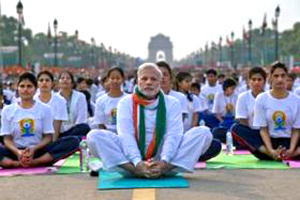New Delhi, Jun 19: As many as 57 Union ministers will spread across the country on Tuesday for the 2nd International Yoga Day programmes, with Prime Minister Narendra Modi performing the ancient Indian physical exercise in Chandigarh.
The Ministers will be leading various programmes hosted by the government across the country during the mega event, including ten of them concentrating in poll-bound Uttar Pradesh to participate in these events.
June 21 was declared as the International Day of Yoga by the United Nations General Assembly in December 2014. Over 190 countries, including 40 Islamic nations, supported the move to have a special day for yoga.
Following this, the first International Yoga Day was observed across the world on June 21 last year with Modi performing yoga along with 36,000 people at the Delhi's historic Rajpath.
The 57 Minister who have been assigned the task of leading this year's programme include Home Minister Rajnath Singh, Finance Minister Arun Jaitley, Defence Minister Manohar Parrikar and HRD Minister Smriti Irani, among others.
Significantly, some 10 Ministers including Jaitley, Singh, Mukhtar Abbas Naqvi, Nirmala Sitharaman and Maneka Gandhi have been lined up for poll-bound Uttar Pradesh to lead these programmes.
The series of programmes this year include mass yoga events, workshops and seminars.
While Modi will be performing Yoga along with thousands of people at the Capitol Complex in Chandigarh, his cabinet colleagues Singh and Jaitley have been assigned the task of leading the 2nd IYD programmes in Lucknow and Mumbai respectively.
Railway Minister Suresh Prabhu has been assigned to lead a programme in Vijaywada in Andhra Pradesh, while Defence Minister Manohar Parrikar is expected to participate in Kanpur.
Urban Development Minister M Venkaiah Naidu is likely to participate in a programme in the national capital while Power Minister Piyush Goyal is slated to perform Yoga with others in Raipur. Health Minister J P Nadda has been assigned Ahmedabad for the purpose.





Comments
Add new comment